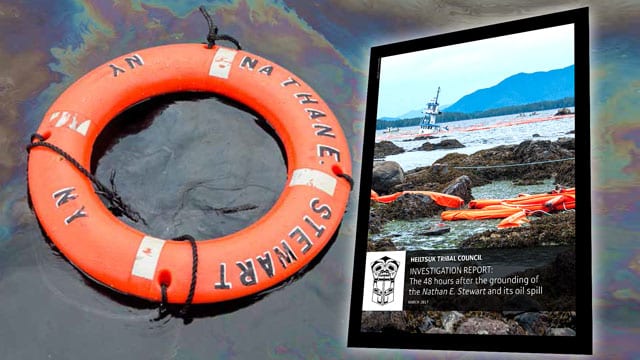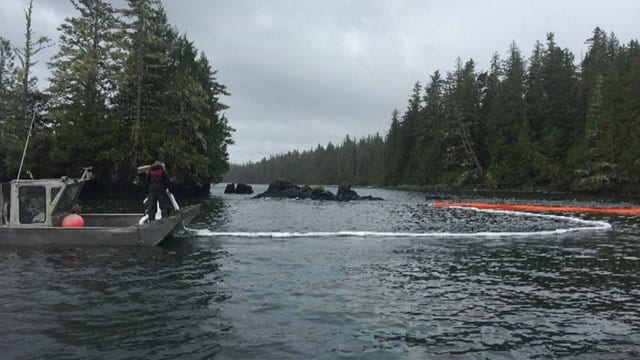

A Texas-based company is scheduled to be sentenced after pleading guilty to a diesel spill from a tug boat that ran aground and sank in a First Nation’s fishing territory on British Columbia’s central coast.
The Nathan E. Stewart spilled 110,000 litres of diesel and heavy oils in October 2016 and the Transportation Safety Board ruled last year a crew member missed a planned course change because he fell asleep while alone on watch.
Court documents on the provincial court website show Kirby Corp. has pleaded guilty to three of nine counts while a civil case for damages filed by the Heiltsuk Nation is ongoing.
The guilty pleas are related to separate counts under the Fisheries Act, the Migratory Birds Convention Act and the Pilotage Act for the fuel spill that damaged both fish and birds, and for failing to have a pilot aboard the vessel.
Chief Marilyn Slett of the Heiltsuk Nation said the hearing on Tuesday will include a sentencing circle of community members, chiefs, first responders and representatives for Kirby as part of the proceedings that will be held at a gym in Bella Bella to accommodate observers.
“It’s more customary to our way to sit in a circle rather than a western courtroom appearance,” she said.
Kirby spokesman Matt Woodruff was not available for comment.
Slett said her community has waited nearly three years to have a voice in connection with an incident that devastated the lives of so many people who fished in the area for sustenance and employment but have still not been able to return to that culturally significant harvesting practice.
“It’s part of our bread basket,” she said of Gale Creek, the site of the spill. “It’s a place where the community would harvest, at a minimum, 25 food species and these included black cod, clams, crab, halibut, kelp, rock cod and various species of salmon.
“We have one grocery store in our community so we rely heavily on our marine resources to be healthy, to live.”
Read More:
Report on grounded tug, oil spill in B.C. released
Beaches were contaminated just when the community was preparing for a commercial clam fishery that would have supported 50 families and no traditional marine harvesting has since been done in the area, Slett said.
Kirby has yet to do an environmental impact assessment to determine the state of the spill site as the Heiltsuk continue to use their own resources to conduct research, she said, adding the village site used by five tribes that are part of the nation was previously “pristine.”
Slett said she’s concerned about the lack of an adequate oil spill response system nearly three years after the spill despite an Oceans Protection Plan announced by the federal government in 2016 in connection with the planned Trans Mountain pipeline expansion.
“The state of marine response today is still the same. Until we are able to come to agreements and partnerships around including Indigenous communities in marine response in the central coast the Heiltsuk community is still very much in a vulnerable position,” she said.
The Heiltsuk Nation has been in discussions with Transport Canada and the coast guard to provide resources to First Nations first responders in case of another spill due to concerns that a contractor did not arrive on site until the evening, hours after the early-morning incident in 2016, Slett said.









